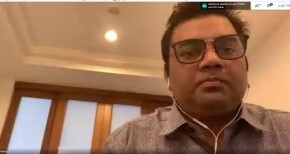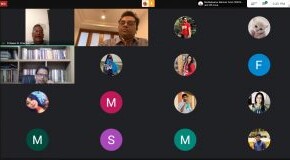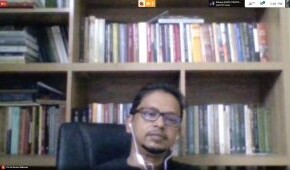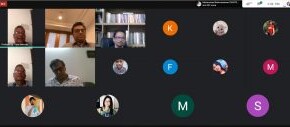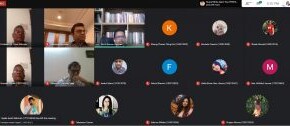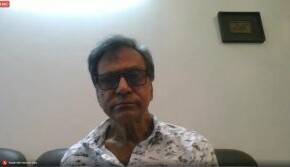DEH Summer ’20 First CI Forum
The Department of English and Humanities (DEH) at the University of Liberal Arts Bangladesh organized the first forum of its Summer 2020 Curriculum Integration (CI) program on August 6, 2020. The CI is a student-centered event where faculty members and public intellectuals engage students critically by focusing on a chosen theme. The theme for this semester is “Pandemic: A Pandora’s Box – Covid-19 and beyond.” Students are expected to apply some of the aspects of the discussed topic in course-related projects.
Invited discussants for this forum were Professor Mohammed Omar Rahman and Professor Din M. Sumon Rahman of ULAB. The session was moderated by the Pro-Vice Chancellor and Head of DEH, Professor Shamsad Mortuza.
Prof. Omar Rahman is an academic psychiatrist and epidemiologist/demographer who is currently Dean of Research and Professor of Epidemiology and Demography at ULAB. Prof. Sumon Rahman, also teaching at ULAB in the Dept. of Media Studies & Journalism (MSJ), is a Bangladeshi writer and cultural studies scholar.
The program’s moderator, Prof. Shamsad Mortuza, opened the discussion by asking the speakers to reflect on the way the narrative of the Coronavirus has been unpacked against the background of the lockdown. During this lockdown and the state of isolation, “a social cohesion must come out by not being together,” and that “we need to work together in trying to be isolated,” were Prof. Omar’s first responses. He referred to previous occurrences of plagues in different centuries to emphasize that although the mortality rate for COVID-19 “is significantly lower” than previous plagues, the responses are very similar. In relation to the discipline, he said, “We have a lot to learn from literature in terms of how we deal with it” or how to deal with a reality which does not make sense anymore, as has also been narrated by Albert Camus in his novel, The Plague. To reflect on the spread of the virus, Prof. Omar said that there is a tendency among people to believe that it is an “egalitarian epidemic” because it is a virus and for that matter, it might not distinguish between people. By referring to a course that he teaches at ULAB called Health and Society, he suggested, “Unfortunately that is not the case” and “one’s health is determined by their social position.” Therefore, he asked the students to empathize with the poor, to listen to “the voice of the dispossessed” and be aware of the “structural unfairness of society” which, he believes, have also surfaced in world literature across countries.
Prof. Sumon Rahman unpacked the Corona narrative by distinguishing between disease and epidemic, in which case, the first experience is individual, while the second one is social. The social experience is a holistic experience, and only by looking at it holistically, can one measure the class dimension of the problem. Prof. Sumon also claimed that the word “quarantine”’ is nothing new to us since it has been used in 19th century Bengal and in Bangla literary texts. He explained how the people in different times and places (like slums), and with different experiences of migration respond to death. Prof. Sumon also discussed how “extreme situations” like lockdowns might unfold narratives by making them transparent, which we do not hear during “normal” times. Some of the “unbelievable” stories heard include how people are trying to leave the country, buying hospitals, and setting up ICUs in their homes.
In response to the question on when and whether we should go back to normal school, Prof. Omar said that if the children go to school, they might bring the virus home to their elderly and vulnerable family members. On the other hand, if they do not go back to school, the parents cannot go back to work as there would be no one to take care of the children at home. In the case of Bangladesh, the government has decided not to open schools yet, and Prof. Omar deems it a “prudent” decision.
To the final question posed by Prof. Shamsad regarding how the current pandemic narrative would shape future literary narratives, that is, the stories of deaths and diseases, Prof. Omar replied that “nothing changed” since 1665, a reference to Daniel Defoe’s depiction of the Bubonic Plague in London in a book titled, A Journal of the Plague. The reality is, according to Prof. Omar, the poor die everywhere and every day. Now everyone, including the liberal political enthusiasts, has become interested in the narratives of death, or what Prof. Sumon calls “necro-narratives,” and that is perhaps because we have encountered “a visible predator” in front of us, something that attacks indiscriminately. By referring to the condition of the US, Prof. Omar implied that perhaps one positive aspect of the Corona experience is that now we can talk about a “shared humanity” and a “shared ending” where the rich will have to take care of the poor through redistribution of wealth and a strong health care system. He concluded on a positive note that perhaps this experience will make us more empathetic – people in a position of power and with resources to help others would lend a hand not because they will be rewarded but because that would be the most ethical or moral thing to do. These gestures should surface in the future narratives too and Prof. Sumon iterated that in literary and popular media texts, references to the pandemic have already occurred. The discussion ended with Prof. Sumon’s recitation of his poem “Brishti Hochhe” from his necro-narrative series, composed during this pandemic.
The floor was then opened up for a Q&A session during which students asked some very interesting questions on the discussion they had heard. The program ended with concluding remarks and a vote of thanks by Prof. Kaiser Haq, Dean of the School of Arts and Humanities at ULAB.

